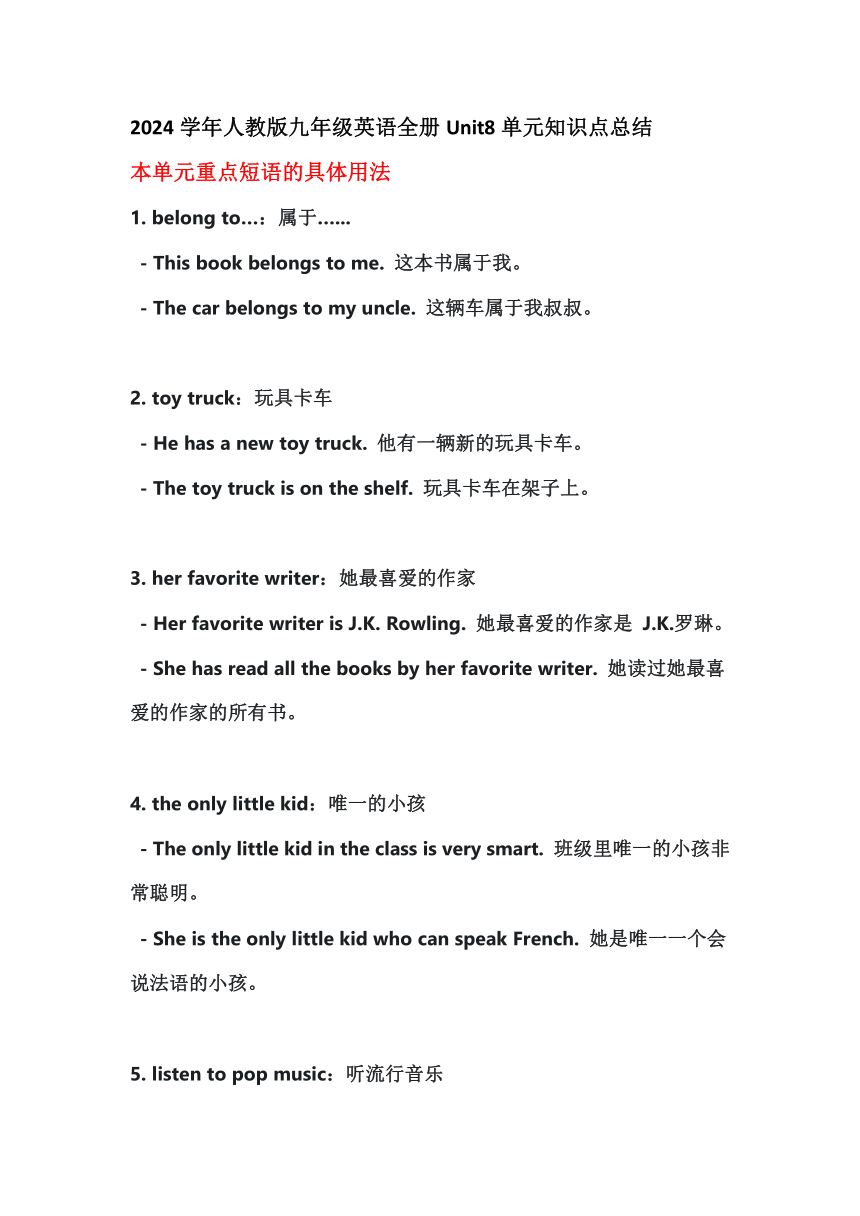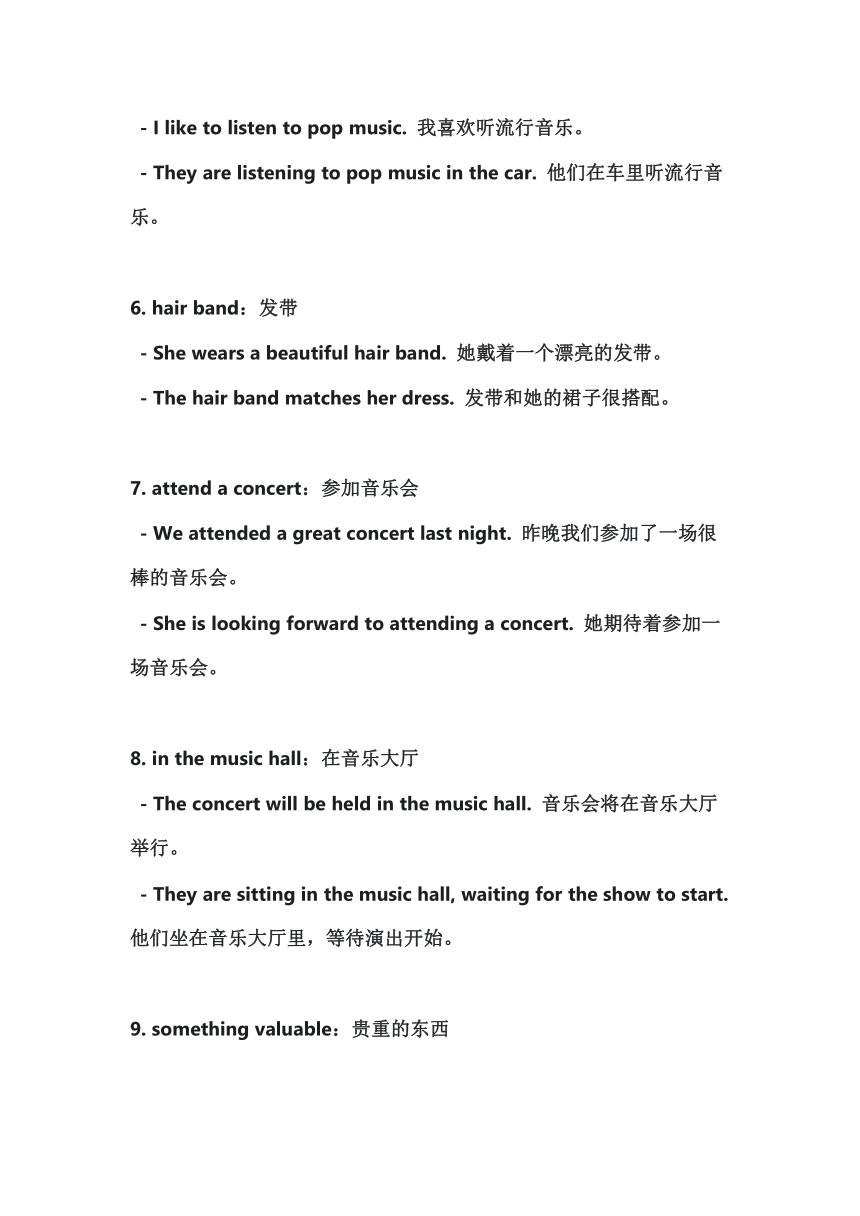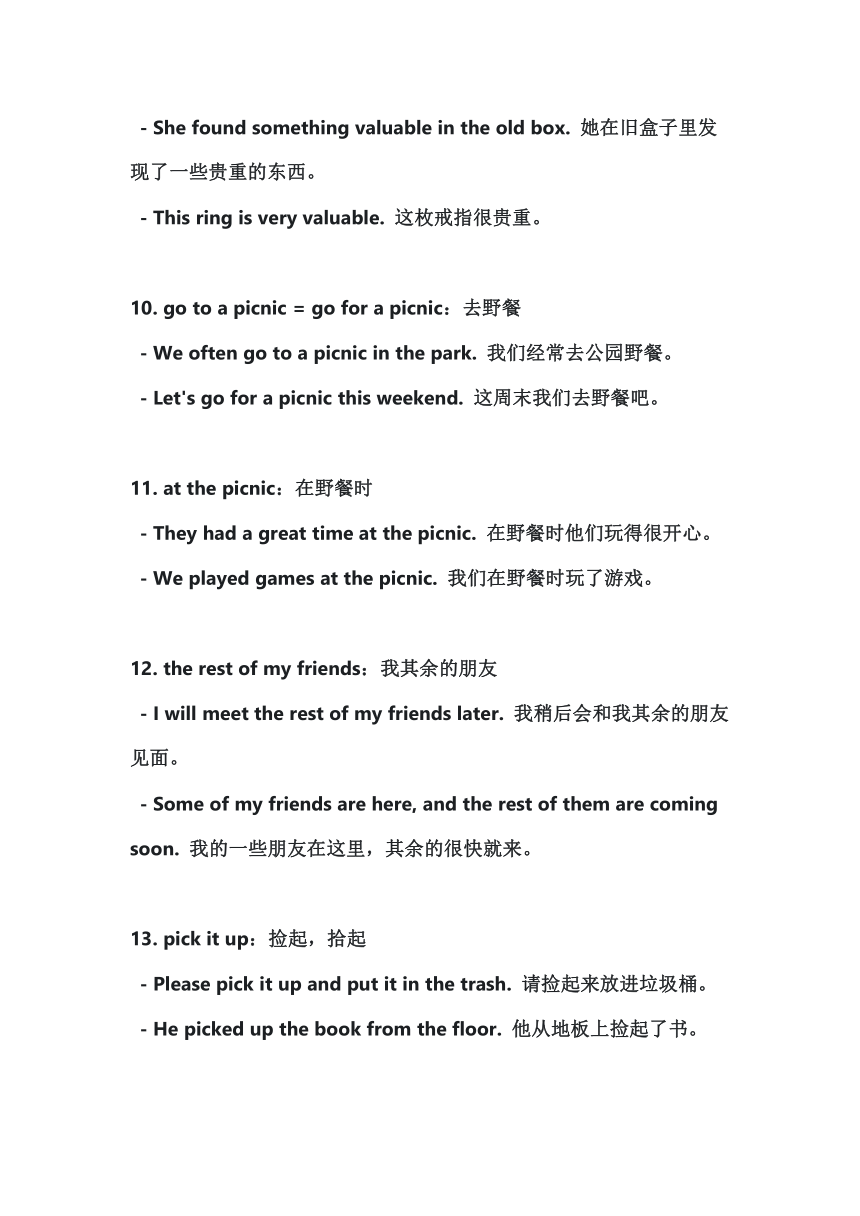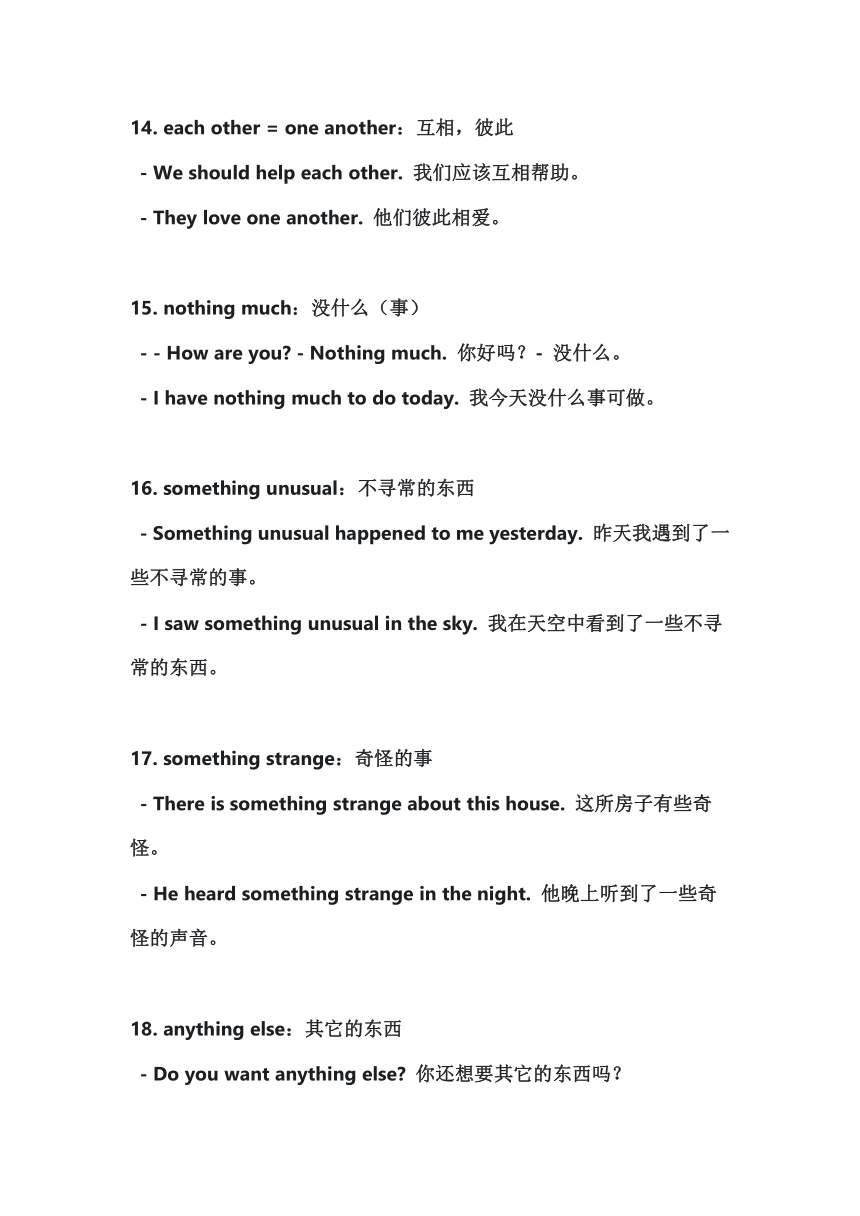人教版九年级全册Unit8It must belong to Carla.单元知识点总结
文档属性
| 名称 | 人教版九年级全册Unit8It must belong to Carla.单元知识点总结 |

|
|
| 格式 | docx | ||
| 文件大小 | 27.0KB | ||
| 资源类型 | 教案 | ||
| 版本资源 | 人教新目标(Go for it)版 | ||
| 科目 | 英语 | ||
| 更新时间 | 2024-02-25 19:55:51 | ||
图片预览





文档简介
2024学年人教版九年级英语全册Unit8单元知识点总结
本单元重点短语的具体用法
1. belong to…:属于…...
- This book belongs to me. 这本书属于我。
- The car belongs to my uncle. 这辆车属于我叔叔。
2. toy truck:玩具卡车
- He has a new toy truck. 他有一辆新的玩具卡车。
- The toy truck is on the shelf. 玩具卡车在架子上。
3. her favorite writer:她最喜爱的作家
- Her favorite writer is J.K. Rowling. 她最喜爱的作家是 J.K.罗琳。
- She has read all the books by her favorite writer. 她读过她最喜爱的作家的所有书。
4. the only little kid:唯一的小孩
- The only little kid in the class is very smart. 班级里唯一的小孩非常聪明。
- She is the only little kid who can speak French. 她是唯一一个会说法语的小孩。
5. listen to pop music:听流行音乐
- I like to listen to pop music. 我喜欢听流行音乐。
- They are listening to pop music in the car. 他们在车里听流行音乐。
6. hair band:发带
- She wears a beautiful hair band. 她戴着一个漂亮的发带。
- The hair band matches her dress. 发带和她的裙子很搭配。
7. attend a concert:参加音乐会
- We attended a great concert last night. 昨晚我们参加了一场很棒的音乐会。
- She is looking forward to attending a concert. 她期待着参加一场音乐会。
8. in the music hall:在音乐大厅
- The concert will be held in the music hall. 音乐会将在音乐大厅举行。
- They are sitting in the music hall, waiting for the show to start. 他们坐在音乐大厅里,等待演出开始。
9. something valuable:贵重的东西
- She found something valuable in the old box. 她在旧盒子里发现了一些贵重的东西。
- This ring is very valuable. 这枚戒指很贵重。
10. go to a picnic = go for a picnic:去野餐
- We often go to a picnic in the park. 我们经常去公园野餐。
- Let's go for a picnic this weekend. 这周末我们去野餐吧。
11. at the picnic:在野餐时
- They had a great time at the picnic. 在野餐时他们玩得很开心。
- We played games at the picnic. 我们在野餐时玩了游戏。
12. the rest of my friends:我其余的朋友
- I will meet the rest of my friends later. 我稍后会和我其余的朋友见面。
- Some of my friends are here, and the rest of them are coming soon. 我的一些朋友在这里,其余的很快就来。
13. pick it up:捡起,拾起
- Please pick it up and put it in the trash. 请捡起来放进垃圾桶。
- He picked up the book from the floor. 他从地板上捡起了书。
14. each other = one another:互相,彼此
- We should help each other. 我们应该互相帮助。
- They love one another. 他们彼此相爱。
15. nothing much:没什么(事)
- - How are you - Nothing much. 你好吗?- 没什么。
- I have nothing much to do today. 我今天没什么事可做。
16. something unusual:不寻常的东西
- Something unusual happened to me yesterday. 昨天我遇到了一些不寻常的事。
- I saw something unusual in the sky. 我在天空中看到了一些不寻常的东西。
17. something strange:奇怪的事
- There is something strange about this house. 这所房子有些奇怪。
- He heard something strange in the night. 他晚上听到了一些奇怪的声音。
18. anything else:其它的东西
- Do you want anything else 你还想要其它的东西吗?
- Is there anything else I can do for you 还有什么我可以为你做的吗?
19. be interviewed by…:被…采访
- She was interviewed by the local newspaper. 她接受了当地报纸的采访。
- He will be interviewed by a TV reporter. 他将接受电视记者的采访。
20. strange noises:奇怪的声音
- We heard strange noises coming from the basement. 我们听到从地下室传来奇怪的声音。
- The strange noises woke us up in the middle of the night. 奇怪的声音在半夜把我们吵醒了。
21. outside our window:在我们的窗外
- There was a bird outside our window. 在我们的窗外有一只鸟。
- We saw a beautiful rainbow outside our window. 我们在窗外看到了一道美丽的彩虹。
22. next-door neighbor:隔壁邻居
- Our next-door neighbor is very friendly. 我们的隔壁邻居非常友好。
- We have a good relationship with our next-door neighbor. 我们和隔壁邻居关系很好。
23. at first:首先,起初
- At first, I didn't like the idea. 起初,我不喜欢这个想法。
- Everything was fine at first. 一开始一切都很好。
24. run away:逃走
- The thief ran away when he saw the police. 小偷看到警察就逃走了。
- She tried to run away but was caught. 她试图逃走,但被抓住了。
25. feel uneasy:感到不安
- I feel uneasy about the situation. 我对这种情况感到不安。
- He has been feeling uneasy lately. 他最近一直感到不安。
26. have no idea = don't know:不知道
- I have no idea where he is. 我不知道他在哪里。
- She doesn't know what to do. 她不知道该怎么做。
27. go away:走开,离开
- Please go away and leave me alone. 请走开,让我一个人待着。
- The storm went away after a few hours. 几个小时后暴风雨过去了。
28. noise-maker:噪音的制造者
- Who is the noise-maker 谁是噪音的制造者?
- We need to find the noise-maker and ask him to stop. 我们需要找到噪音的制造者并让他停止。
29. have fun doing sth.:做某事开心
- The kids are having fun playing in the park. 孩子们在公园里玩得很开心。
- We had fun swimming in the pool. 我们在游泳池里游泳很开心。
30. create fear:制造恐惧
- The movie creates a lot of fear. 这部电影制造了很多恐惧。
- His words were meant to create fear. 他的话旨在制造恐惧。
本单元重点句子
1. If you have any idea where it might be, please call me.
如果你知道它可能在哪,请打电话给我。
2. It’s crucial that I study for it because it counts 30% to the final exam.
关键是我必须学,因为它占期末考试的30%。
3. What do you think “anxious“ means
你认为“anxious”是什么意思?
4. He could be running for exercise.
他可能是在跑步锻炼身体。
5. He might be running to catch a bus.
他可能是在跑着赶公共汽车。
6. Why do you think the man is running
你觉得那个男的为什么跑?
本单元重点知识点讲解
1. 情态动词 must、may、might、could、can't 都可以表示对现在情况的揣测和推断,但含义有所不同。must 表示一定、肯定(100%的可能性);may、might、could 表示有可能、也许(20%-80%的可能性);can't 表示不可能、不会(可能性几乎为零)。它们后面都接动词原形。
例如:He must be at home. 他一定在家。
2. whose 是个疑问词,作定语,后面接名词。例如:Whose pen is this 这是谁的笔?
3. 当 play 指弹奏西洋乐器时,常在乐器前用定冠词 the;当 play 指进行球类运动时,则不用定冠词。例如:play the piano 弹钢琴;play soccer 踢足球。
4. if 引导的条件状语从句,主句用一般将来时,从句用一般现在时代替将来时。例如:If it rains tomorrow, we will stay at home. 如果明天下雨,我们将待在家里。
5. if you have any idea 等于 if you know,表示“如果你知道”。
6. on 关于(学术、科目)。例如:This is a book on history. 这是一本关于历史的书。
7. because of 表示“由于”,后面接名词、代词或名词性短语;because 后面接从句。例如:I didn't go to school because of the rain. 因为下雨,我没去上学。
8. own 可作动词,意为“拥有”,其名词形式是 owner;listen 的名词形式是 listener;learn 的名词形式是 learner。
9. catch a bus 表示“赶公车”。
10. neighbor 指人,意为“邻居”;neighborhood 既可以指地区,也可以指附近地区的人。
11. 当形容词修饰 something, anything, nothing, everything 等不定代词时,要放在这些词的后面。例如:There is something strange. 有一些奇怪的东西。
12. there be sb./sth. doing 表示“有……正在……”。例如:There is a girl singing in the room. 房间里有个女孩在唱歌。
13. escape from 表示“从……逃跑出来”。例如:The prisoner escaped from the prison. 囚犯从监狱里逃出来了。
14. an ocean of 表示“极多的”。例如:He has an ocean of knowledge. 他有极多的知识。
15. unhappy 的反义词是 happy;dishonest 的反义词是 honest。
16. get on 表示“上车”;get off 表示“下车”。
17. look for 强调找的动作;find 强调找的结果。例如:I'm looking for my keys. 我在找我的钥匙。
18. hear 强调听的结果;listen 强调听的动作。例如:I can't hear you. 我听不到你说话。
19. try one's best to do sth. 意为“尽某人最大努力去做某事”。例如:I will try my best to pass the exam. 我会尽我最大努力通过考试。
20. 现在完成时态表示过去发生的动作对现在造成的影响或结果,或者表示从过去某一时间开始一直持续到现在的动作或状态。其构成是“have/has+过去分词”。例如:I have finished my homework. 我已经完成了我的作业。
作文训练
本单元话题为“神秘事物”,围绕这一话题对我们生活中出现的不确定的事情进行推理判断。要求我们恰当使用情态动词客观的对提供的材料进行分析,以推测某件物品可能是某人的或某人正在做什么。写作此类话题作文的常用表达有:
(1) sth. must /can’t/might/could be...
(2) sb. must/can’t/might/could be doing…
典型例题
你在上学的路上捡到了一件T-shirt,它是你校某位同学的。请根据以下提示做出一个合理的推断,并把推断的经过和结果写出来。可适当发挥,词数80词左右。
提示:
1. Mary和Sally的T恤衫都丢了
2. T恤衫上有长头发
3. T恤衫口袋里有一张信用卡和一张刘德华的照片
优秀范文
Oh,look! There is a T-shirt here. It’s a school T-shirt. The owner must be a student. Mary and sally lost their T-shirt. Could it be Mary’s or Sally’s There is long hair on the T-shirt. But both of them have long hair. There is a photo of Liu Dehua in the pocket. Sally likes Liu Dehua very much, but Mary’s favorite star is Sun Yanzi. So, it belongs to sally. There is credit card too. Then, it must be sally’s school T-shirt because she is the only person who has a credit card in our school.
本单元重点短语的具体用法
1. belong to…:属于…...
- This book belongs to me. 这本书属于我。
- The car belongs to my uncle. 这辆车属于我叔叔。
2. toy truck:玩具卡车
- He has a new toy truck. 他有一辆新的玩具卡车。
- The toy truck is on the shelf. 玩具卡车在架子上。
3. her favorite writer:她最喜爱的作家
- Her favorite writer is J.K. Rowling. 她最喜爱的作家是 J.K.罗琳。
- She has read all the books by her favorite writer. 她读过她最喜爱的作家的所有书。
4. the only little kid:唯一的小孩
- The only little kid in the class is very smart. 班级里唯一的小孩非常聪明。
- She is the only little kid who can speak French. 她是唯一一个会说法语的小孩。
5. listen to pop music:听流行音乐
- I like to listen to pop music. 我喜欢听流行音乐。
- They are listening to pop music in the car. 他们在车里听流行音乐。
6. hair band:发带
- She wears a beautiful hair band. 她戴着一个漂亮的发带。
- The hair band matches her dress. 发带和她的裙子很搭配。
7. attend a concert:参加音乐会
- We attended a great concert last night. 昨晚我们参加了一场很棒的音乐会。
- She is looking forward to attending a concert. 她期待着参加一场音乐会。
8. in the music hall:在音乐大厅
- The concert will be held in the music hall. 音乐会将在音乐大厅举行。
- They are sitting in the music hall, waiting for the show to start. 他们坐在音乐大厅里,等待演出开始。
9. something valuable:贵重的东西
- She found something valuable in the old box. 她在旧盒子里发现了一些贵重的东西。
- This ring is very valuable. 这枚戒指很贵重。
10. go to a picnic = go for a picnic:去野餐
- We often go to a picnic in the park. 我们经常去公园野餐。
- Let's go for a picnic this weekend. 这周末我们去野餐吧。
11. at the picnic:在野餐时
- They had a great time at the picnic. 在野餐时他们玩得很开心。
- We played games at the picnic. 我们在野餐时玩了游戏。
12. the rest of my friends:我其余的朋友
- I will meet the rest of my friends later. 我稍后会和我其余的朋友见面。
- Some of my friends are here, and the rest of them are coming soon. 我的一些朋友在这里,其余的很快就来。
13. pick it up:捡起,拾起
- Please pick it up and put it in the trash. 请捡起来放进垃圾桶。
- He picked up the book from the floor. 他从地板上捡起了书。
14. each other = one another:互相,彼此
- We should help each other. 我们应该互相帮助。
- They love one another. 他们彼此相爱。
15. nothing much:没什么(事)
- - How are you - Nothing much. 你好吗?- 没什么。
- I have nothing much to do today. 我今天没什么事可做。
16. something unusual:不寻常的东西
- Something unusual happened to me yesterday. 昨天我遇到了一些不寻常的事。
- I saw something unusual in the sky. 我在天空中看到了一些不寻常的东西。
17. something strange:奇怪的事
- There is something strange about this house. 这所房子有些奇怪。
- He heard something strange in the night. 他晚上听到了一些奇怪的声音。
18. anything else:其它的东西
- Do you want anything else 你还想要其它的东西吗?
- Is there anything else I can do for you 还有什么我可以为你做的吗?
19. be interviewed by…:被…采访
- She was interviewed by the local newspaper. 她接受了当地报纸的采访。
- He will be interviewed by a TV reporter. 他将接受电视记者的采访。
20. strange noises:奇怪的声音
- We heard strange noises coming from the basement. 我们听到从地下室传来奇怪的声音。
- The strange noises woke us up in the middle of the night. 奇怪的声音在半夜把我们吵醒了。
21. outside our window:在我们的窗外
- There was a bird outside our window. 在我们的窗外有一只鸟。
- We saw a beautiful rainbow outside our window. 我们在窗外看到了一道美丽的彩虹。
22. next-door neighbor:隔壁邻居
- Our next-door neighbor is very friendly. 我们的隔壁邻居非常友好。
- We have a good relationship with our next-door neighbor. 我们和隔壁邻居关系很好。
23. at first:首先,起初
- At first, I didn't like the idea. 起初,我不喜欢这个想法。
- Everything was fine at first. 一开始一切都很好。
24. run away:逃走
- The thief ran away when he saw the police. 小偷看到警察就逃走了。
- She tried to run away but was caught. 她试图逃走,但被抓住了。
25. feel uneasy:感到不安
- I feel uneasy about the situation. 我对这种情况感到不安。
- He has been feeling uneasy lately. 他最近一直感到不安。
26. have no idea = don't know:不知道
- I have no idea where he is. 我不知道他在哪里。
- She doesn't know what to do. 她不知道该怎么做。
27. go away:走开,离开
- Please go away and leave me alone. 请走开,让我一个人待着。
- The storm went away after a few hours. 几个小时后暴风雨过去了。
28. noise-maker:噪音的制造者
- Who is the noise-maker 谁是噪音的制造者?
- We need to find the noise-maker and ask him to stop. 我们需要找到噪音的制造者并让他停止。
29. have fun doing sth.:做某事开心
- The kids are having fun playing in the park. 孩子们在公园里玩得很开心。
- We had fun swimming in the pool. 我们在游泳池里游泳很开心。
30. create fear:制造恐惧
- The movie creates a lot of fear. 这部电影制造了很多恐惧。
- His words were meant to create fear. 他的话旨在制造恐惧。
本单元重点句子
1. If you have any idea where it might be, please call me.
如果你知道它可能在哪,请打电话给我。
2. It’s crucial that I study for it because it counts 30% to the final exam.
关键是我必须学,因为它占期末考试的30%。
3. What do you think “anxious“ means
你认为“anxious”是什么意思?
4. He could be running for exercise.
他可能是在跑步锻炼身体。
5. He might be running to catch a bus.
他可能是在跑着赶公共汽车。
6. Why do you think the man is running
你觉得那个男的为什么跑?
本单元重点知识点讲解
1. 情态动词 must、may、might、could、can't 都可以表示对现在情况的揣测和推断,但含义有所不同。must 表示一定、肯定(100%的可能性);may、might、could 表示有可能、也许(20%-80%的可能性);can't 表示不可能、不会(可能性几乎为零)。它们后面都接动词原形。
例如:He must be at home. 他一定在家。
2. whose 是个疑问词,作定语,后面接名词。例如:Whose pen is this 这是谁的笔?
3. 当 play 指弹奏西洋乐器时,常在乐器前用定冠词 the;当 play 指进行球类运动时,则不用定冠词。例如:play the piano 弹钢琴;play soccer 踢足球。
4. if 引导的条件状语从句,主句用一般将来时,从句用一般现在时代替将来时。例如:If it rains tomorrow, we will stay at home. 如果明天下雨,我们将待在家里。
5. if you have any idea 等于 if you know,表示“如果你知道”。
6. on 关于(学术、科目)。例如:This is a book on history. 这是一本关于历史的书。
7. because of 表示“由于”,后面接名词、代词或名词性短语;because 后面接从句。例如:I didn't go to school because of the rain. 因为下雨,我没去上学。
8. own 可作动词,意为“拥有”,其名词形式是 owner;listen 的名词形式是 listener;learn 的名词形式是 learner。
9. catch a bus 表示“赶公车”。
10. neighbor 指人,意为“邻居”;neighborhood 既可以指地区,也可以指附近地区的人。
11. 当形容词修饰 something, anything, nothing, everything 等不定代词时,要放在这些词的后面。例如:There is something strange. 有一些奇怪的东西。
12. there be sb./sth. doing 表示“有……正在……”。例如:There is a girl singing in the room. 房间里有个女孩在唱歌。
13. escape from 表示“从……逃跑出来”。例如:The prisoner escaped from the prison. 囚犯从监狱里逃出来了。
14. an ocean of 表示“极多的”。例如:He has an ocean of knowledge. 他有极多的知识。
15. unhappy 的反义词是 happy;dishonest 的反义词是 honest。
16. get on 表示“上车”;get off 表示“下车”。
17. look for 强调找的动作;find 强调找的结果。例如:I'm looking for my keys. 我在找我的钥匙。
18. hear 强调听的结果;listen 强调听的动作。例如:I can't hear you. 我听不到你说话。
19. try one's best to do sth. 意为“尽某人最大努力去做某事”。例如:I will try my best to pass the exam. 我会尽我最大努力通过考试。
20. 现在完成时态表示过去发生的动作对现在造成的影响或结果,或者表示从过去某一时间开始一直持续到现在的动作或状态。其构成是“have/has+过去分词”。例如:I have finished my homework. 我已经完成了我的作业。
作文训练
本单元话题为“神秘事物”,围绕这一话题对我们生活中出现的不确定的事情进行推理判断。要求我们恰当使用情态动词客观的对提供的材料进行分析,以推测某件物品可能是某人的或某人正在做什么。写作此类话题作文的常用表达有:
(1) sth. must /can’t/might/could be...
(2) sb. must/can’t/might/could be doing…
典型例题
你在上学的路上捡到了一件T-shirt,它是你校某位同学的。请根据以下提示做出一个合理的推断,并把推断的经过和结果写出来。可适当发挥,词数80词左右。
提示:
1. Mary和Sally的T恤衫都丢了
2. T恤衫上有长头发
3. T恤衫口袋里有一张信用卡和一张刘德华的照片
优秀范文
Oh,look! There is a T-shirt here. It’s a school T-shirt. The owner must be a student. Mary and sally lost their T-shirt. Could it be Mary’s or Sally’s There is long hair on the T-shirt. But both of them have long hair. There is a photo of Liu Dehua in the pocket. Sally likes Liu Dehua very much, but Mary’s favorite star is Sun Yanzi. So, it belongs to sally. There is credit card too. Then, it must be sally’s school T-shirt because she is the only person who has a credit card in our school.
同课章节目录
- Unit 1 How can we become good learners.
- Section A
- Section B
- Unit 2 I think that mooncakes are delicious!
- Section A
- Section B
- Unit 3 Could you please tell me where the restroom
- Section A
- Section B
- Unit 4 I used to be afraid of the dark.
- Section A
- Section B
- Unit 5 What are the shirts made of?
- Section A
- Section B
- Review of Units 1-5
- Unit 6 When was it invented?
- Section A
- Section B
- Unit 7 Teenagers should be allowed to choose their
- Section A
- Section B
- Unit 8 It must belong to Carla.
- Section A
- Section B
- Unit 9 I like music that I can dance to.
- Section A
- Section B
- Unit 10 You're supposed to shake hands.
- Section A
- Section B
- Review of Units 6-10
- Unit 11 Sad movies make me cry.
- Section A
- Section B
- Unit 12 Life is full of the unexpected
- Section A
- Section B
- Unit 13 We're trying to save the earth!
- Section A
- Section B
- Unit 14 I remember meeting all of you in Grade 7.
- Section A
- Section B
- Review of Units 11-14
